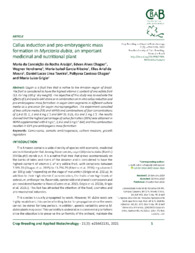Callus induction and pro-embryogenic mass formation in Myrciaria dubia, an important medicinal and nutritional plant.
Callus induction and pro-embryogenic mass formation in Myrciaria dubia, an important medicinal and nutritional plant.
Author(s): ARAÚJO, M. da C. da R.; CHAGAS, E. A.; VENDRAME, W.; RIBEIRO, M. I. G.; MOURA, E. A. de; TAVEIRA, D. L. L.; CHAGAS, P. C.; GRIGIO, M. L.
Summary: Caçari is a fruit tree that is native to the Amazon region of Brazil. The fruit is considered to have the highest vitamin C content of any edible fruit (13.757 mg 100 g-1 dry weight). The objective of this study was to evaluate the effects of 2,4-D and 6-BAP alone or in combination on in vitro callus induction and pro-embryogenic mass formation in caçari stem segments in different culture media as a precursor for caçari micropropagation. The experiment consisted of two culture media (MS and WPM) and combinations of four concentrations of 2,4-D (0, 1, 2 and 4 mg L-1) and BAP (0, 0.25, 0.5 and 1 mg L-1). The results showed that the highest percentage of callus formation (99%) was obtained in WPM supplemented with 4 mg L-1, 2,4-D and 1 mg L-1 BAP, and this combination resulted in 93% pro-embryogenic mass formation.
Publication year: 2021
Types of publication: Journal article
Unit: Embrapa Roraima
Keywords: Camu-camu, Growth regulators, Somatic embryogenesis
Observation
Some of Embrapa's publications are published as ePub files. To read them, use or download one of the following free software options to your computer or mobile device. Android: Google Play Books; IOS: iBooks; Windows and Linux: Calibre.
Access other publications
Access the Agricultural Research Database (BDPA) to consult Embrapa's full library collection and records.
Visit Embrapa Bookstore to purchase books and other publications sold by Embrapa.

